Promoting Livelihood
ICICI Foundation has been actively supporting means of livelihood among India’s urban and rural populations through a series of projects. Its livelihood programmes are aimed at strengthening the local ecosystems in the areas of value chain development for rural activities. Till March 31, 2024, ICICI Foundation has benefitted 3.7 million people through its livelihood programmes since inception. It has benefitted 80,000 individuals across various projects in fiscal 2024.
Value Chain Initiatives
ICICI Foundation’s rural value chain interventions have been providing sustainable livelihoods in the villages. The value chain-based projects focus on enhancing the village ecosystem through capacity building, increasing the value of local produce, and enhancing income of the villagers. The Foundation also offers market linkages and access to credit facilities to beneficiaries.
As part of the value chain projects in agriculture, the projects of ICICI Foundation include millet farming, mustard cultivation, mushroom and lac farming, dairy farming, goat rearing, and other animal husbandry projects.
ICICI Foundation supports the establishment of processing centres to enable enhancement of income for farmers. It has set up farm tool banks in various regions, offering essential agricultural equipment to small and marginal farmers at affordable rates. Collaboration with local authorities, including the government’s Krishi Vigyan Kendras (KVKs), which provide vocational training, is integral to its efforts.
Value chain-based projects follow a bottom-up approach, starting with an analysis of the macro and micro-environment in targeted village clusters. ICICI Foundation collaborates with community members and local government to assess needs, designing programmes to develop value chains for specific products and services. Utilising local resources efficiently is a key aspect of these interventions. ICICI Foundation also provides pro bono skill development to the local people in the relevant trades.
Key Value Chain Projects
Reviving Millet Farming in Karnataka
In fiscal 2024, ICICI Foundation aided millet farmers in Hanur taluka in Chamarajanagar district, Karnataka, through a comprehensive value chain project. Despite the area’s potential, farmers had stopped millet farming due to erratic rainfall, damage by wildlife and soil degradation from excessive chemicals. The Foundation’s intervention revived millet farming and promoted sustainable agricultural practices for various crops. Additionally, ICICI Foundation completed solar electrification at 12 schools and dug two drinking water borewells, enhancing the area’s overall quality of life.
Project
- Trained farmers in organic farming and millet cultivation.
- Constructed nine check dams to slow water flow and prevent soil erosion.
- Built five ponds and about 40 rainwater harvesting structures to store water.
- Provided battery-operated pesticide sprayers to 520 farmers, tarpaulin to 550 farmers and solar traps to 100 farmers to prevent pest infestation.
- Distributed vermicompost slabs to nearly 300 farmers to reduce fertiliser costs.
- Introduced beekeeping by providing honeybee boxes to 60 farmers, improving pollination and crop production.
Impact
- Trained nearly 1,800 farmers in organic farming across 26 villages in four Gram Panchayats in Hanur.
- Benefitted over 2,100 farmers by facilitating agroforestry plantations.
- Enabled cultivation of maize, millet, and tomatoes across nearly 20 acres due to check dams.
- Improved drinking water availability in villages.
- Reduced cultivation costs and promoted savings.
- Enhanced farmers’ overall income through organic millet cultivation practices.
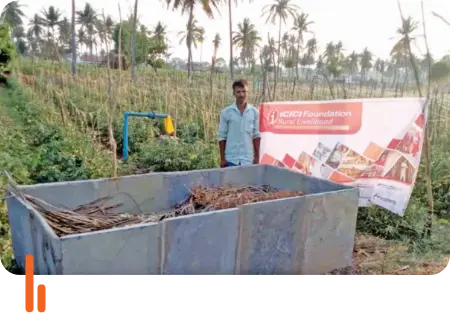
A millet farmer with a vermicompost slab at D.M. Samudra village in Chamarajanagar district, Karnataka
Creating Mustard Value Chain in Haryana
In fiscal 2024, ICICI Foundation supported seven Self-Help Groups (SHGs) in districts of Haryana — four in Hissar and three in Sirsa — to establish mustard oil processing units as part of a sustainable livelihood initiative. SHGs are a team of 10-15 women engaged in livelihood activity. These SHGs, promoted by the Haryana State Rural Livelihood Mission (HSRLM) under India’s National Rural Livelihoods Mission (NRLM), aim to reduce poverty among women and provide them with access to financial services.
Project
- Provided SHGs with cold press oil extraction machines and solar units.
- Covered three blocks — two in Hissar and one in Sirsa district — where mustard farmers faced issues from crop diseases and hailstorms.
- Encouraged women of SHGs to adopt climate-resilient agriculture.
- Supported SHG members with quality seeds, organic composts, and market linkages.
- Trained members in packaging and efficient agricultural practices to reduce usage of seed and fertiliser.
- Established demonstration plots as models of improved farming practices.
Impact
- Increased household income and improved access to financial services.
- Promoted mustard cultivation by providing a platform for farmers to sell and procure produce.
- Ensured better prices for mustard by reducing brokers and middlemen.
- Helped cattle rearers with high-quality cattle feed (mustard cake), a by-product of oil processing.
- Fostered financial inclusion by ensuring direct payments to SHG members’ bank accounts.
- Benefitted 1,000 households since 2022.
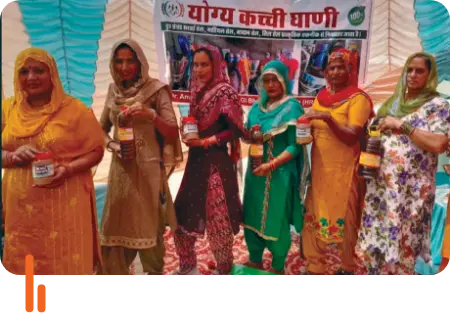
Women selling mustard oil made by them at a buyer-seller meet at Bharukhera village in Sirsa district, Haryana
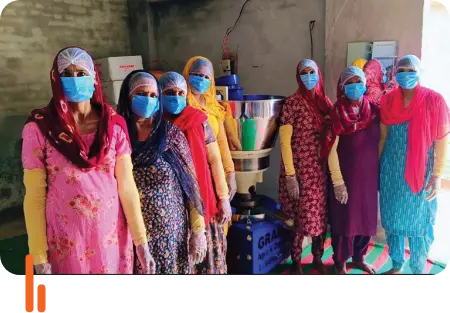
Women processing mustard oil using cold press extraction machine at Adampur village in Hisar district, Haryana
Enhancing Pesticide-Free Farming
As part of its broader efforts to reduce poverty and support low-cost organic farming in Chhattisgarh, ICICI Foundation supported six SHGs in installing as many automatic Jeevamrut units in the state. Jeevamrut is an organic fertiliser unit, which provides essential nutrients to plants, reduces disease and pest infestation, maintains soil moisture, and promotes the activity of beneficial microorganisms and earthworms. These units were installed in three districts namely Durg, Jashpur, and Korba.
With a capacity of 2,000 litres, each unit enables cost-effective preparation of Jeevamrut expeditiously. Over the past two years, these units have produced nearly 80,000 litres of Jeevamrut, boosting productivity, crop quality, and income of the farmers.
In addition, ICICI Foundation has been promoting pesticide-free agriculture by providing solar traps to small farmers. In fiscal 2024, solar traps were provided to farmers at Astur village in Chamarajanagar district, and at Dhoddabeeranahalli village in Chitradurga district, Karnataka.
These devices, charged by sunlight, automatically switch on at dawn to trap harmful insects, each having a capacity to trap 100,000 pests per acre per day. This intervention reduced farmers’ reliance on insecticide purchases, saving time, effort, and costs. Moreover, it has improved soil health by reducing chemical toxins, leading to better crop yield and quality. In fiscal 2024, 168 solar traps were provided to as many farmers.
630
Farmers benefitted from Jeevamrut units
(In fiscal 2024)
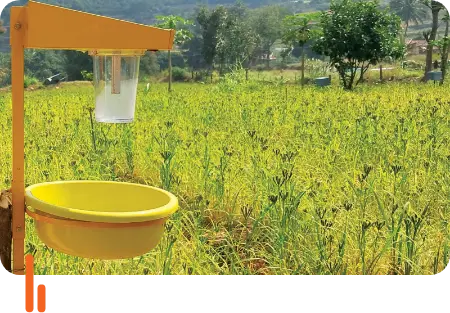
A solar trap installed at Astur village in Chamarajanagar district, Karnataka
Supporting Farmers with Processing Units
ICICI Foundation has been supporting farmers across India by establishing processing units for their produce. In fiscal 2024, ICICI Foundation set up a millet processing unit in Vettavalam, Tiruvannamalai district, Tamil Nadu, to ensure reliable and sustainable income for the farmers. The area’s farmers were struggling to sell their millet crop at a profit.
The processing unit directly benefitted 600 farmers by providing a guaranteed market for their produce by consistently purchasing millet from them. This, in turn, has motivated the farmers to cultivate millet sustainably and invest in future harvests. It has led to an increase in the millet cultivation acreage around the Vettavalam cluster, contributing to a rise in production. The overall agricultural sustainability in the region has improved. ICICI Foundation additionally helped to create market linkages across the state for the millet farmers, thus enhancing their income sustainability and uplifting the quality of their lives.
The 20 members of the Farmer Interest Group (FIG) involved in the unit’s operation have also benefitted, as they are now getting a steady annual income of ₹ 600,000. An FIG is a self-managed, independent group of farmers who pool their existing resources to gain better access to other resources and share in the resulting benefits.
Since fiscal 2021, it has set up over 505 processing units in 21 states across the country. Of these, 104 processing units in 15 states were established in fiscal 2024.
Setting up Farm Tool Centres
Many small farmers in India cannot afford costly agricultural equipment required for farming. ICICI Foundation addressed this issue by setting up farm tool centres in villages. This initiative offers twin benefits to farmers as it helps them hire equipment at a reduced rate and increase their income by using these machines.
In fiscal 2024, ICICI Foundation established five farm equipment-hiring centres in as many villages in Mayiladuthurai district, Tamil Nadu. These centres provide essential tools like power tillers and transplanters to farmers at a reduced rate, helping them to save ₹ 150,000 annually. On an average, the income of a farmer increased by ₹ 400,000 per year.
Similarly, in Chitradurga district, Karnataka, ICICI Foundation set up a farm equipment bank, where owners can rent their equipment when they are not in use. Equipment owners earned additional income of ₹ 84,000 from rentals over two cropping seasons. Further, this initiative reduced agricultural processing time and labour costs for 250 farmers who rented these machines, across 2,000 acres.
Beneficiaries of Processing Units
18,000
In fiscal 2024
24,000
Since fiscal 2021
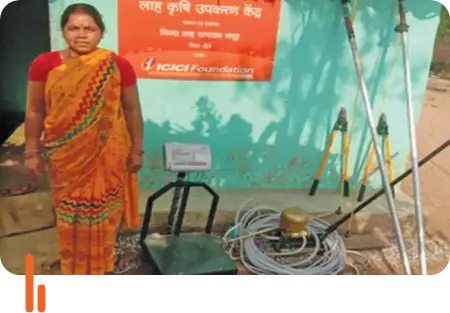
A farmer at a farm tool centre at Silda village in Khunti district, Jharkhand
Promoting Multi-Cropping through Dug Wells
ICICI Foundation constructed 40 dug wells — large, shallow pits from which groundwater can be extracted — in 10 villages in Bankura and Purulia districts of West Bengal. This intervention has brought in a visible change in the cropping pattern, addressing the concern of water scarcity, with the farmers now cultivating different crops, including vegetables, in three seasons. This has promoted crop diversification and enhanced the income of the small and marginalised farmers in the area.
Pillars of ICICI Foundation’s Initatives on Societal Development are:
Previous Topic
Next Topic
Corporate Governance